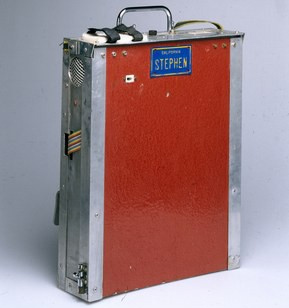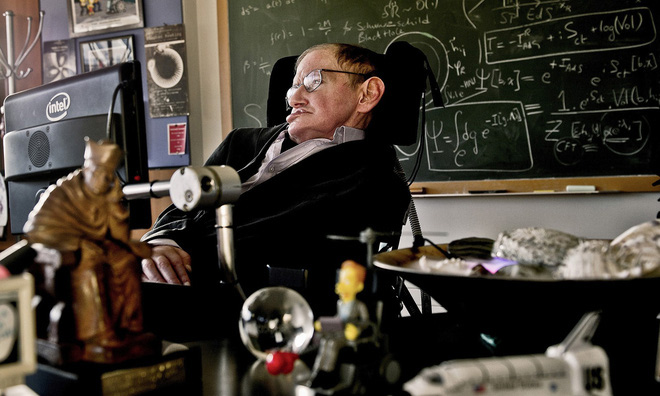This is the technology that helped Stephen Hawking talk to the world when he lost his ability to speak from 1985
In 21, Stephen Hawking suffered from muscular atrophy, and after an operation in 1985, he lost his ability to speak. At first, he had to use spelling boards to talk, raising an eyebrow to pick out the right letters, to form sentences.
Hawking then joined Martin King, a physicist who designed a new communication system. This system uses a computer program called Equalizer that allows users to select words and commands on the computer with the click of a button.
The first Equalizer runs on an Apple II computer, attached to a speech engine from Speech Plus. Later, the system was redesigned to mount Hawking's armrests, allowing him to speak at a speed of 15 words per minute using the thumb movement.

Stephen Hawking in 1986.
But in 2008, Hawking could not press the talk button anymore because the illness was getting worse. His assistant created a device called "cheek button - cheek switch". This device moves the mouse to move continuously through the letters of the alphabet. It is mounted on the glass and uses pink rays to record the movement of the right face muscles when Hawking 'chooses' the character. Then those characters are transmitted to a synthetic computer and converted into speech for pronunciation. Thanks to this device, Hawking can write email, surf the web and even write books.
However, due to the harmful effects of the disease, Hawking's ability to control muscle is decreasing. By 2011, Hawking could only say 2 words per minute, when he sent a letter to Gordon Moore, asking if Intel could help him.

Earlier, Hawking met Gordon Moore at a conference in 1997. At that time, Gordon Moore offered to upgrade the computer he was using to communicate from the AMD platform to Intel and provide a computer. Designed specifically for Hawking, research support technology and upgrade communication systems every two years.
Upon receiving the letter, Moore asked Justin Ratter, the current CTO of Intel. A group of expert human-machine interaction has been established to help Hawking regain the speed of communication as before.
 This is Hawking's "voice" in 1999.
This is Hawking's "voice" in 1999.
At that time, Hawking's communication system was a program called EZ Keys, an improved version of software previously designed by Word Plus. Thanks to a virtual keyboard, an algorithm to guess basic words and a webcam, EZ Keys allowed Hawking to use the mouse to manipulate Windows, surf the web in Firefox, compose lectures on Notepad and make Skype calls.
The latest, most modern solutions have been offered by the research team but are not effective. The eye tracking software did not work because his eyelids collapsed. Unable to apply technology to make an EEG-based computer not catch a strong enough signal from Hawking's brain.

After many trials, the research team came up with various upgrade versions but could not make Hawking happy. Finally, they set up a system to record the entire process of using Hawking's computer, typing Hawking, typing when tired, using the mouse, dragging the size of any window. After studying that 10-hour video, the researchers came up with a special system. After a few months, having made many improvements, they created a software that was just as appealing to Hawking. It uses a SwiftKey word prediction system combined with many of Hawking's documents in Intel's new system to predict from Hawking's intention to say.
In addition, the system has a series of shortcuts that allow Hawking to perform various tasks such as speaking, searching or composing email; a lecture control software .
Intel's new solution helps Hawking double the speed of "speaking", the speed of performing other operations also increased by about 10 times compared to before.
Hawking enjoyed his computer voice, which was created by engineer Dennis Klatt in the 1980s. Hawking's voice was called "Perfect Paul - Perfect Paul".

The research team also plans to make further improvements: as a wheelchair driver system using Hawking's chin, unfortunately, Hawking did not have the opportunity to use them. Stephen Hawking died on March 14, 2018 in Vietnam time.
See more:
- Stephen Hawking's life through photos
- Download Stephen Hawking's space doctoral thesis - Download Properties of Expanding Universes
- Stephen Hawking made a terrifying remark about the future of humanity: "The Earth is dead, it's time to leave"
You should read it
- ★ Stephen Hawking warned: 'Humans have only 100 years left to leave Earth.'
- ★ Stephen Hawking makes a dreaded view of the future of mankind: 'The Earth has perished, time to leave'
- ★ Stephen Hawking and 32 leading physicists signed a letter to protect the doctrine of the origin of the universe
- ★ The dawn of Artificial Intelligence has arrived, mankind is watching!
- ★ 9 typical examples of spirit that surpasses fate